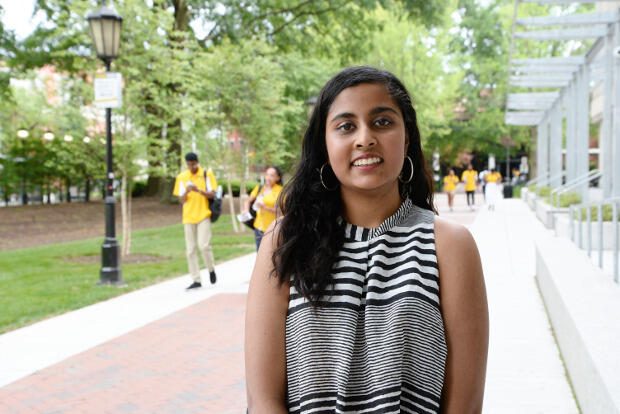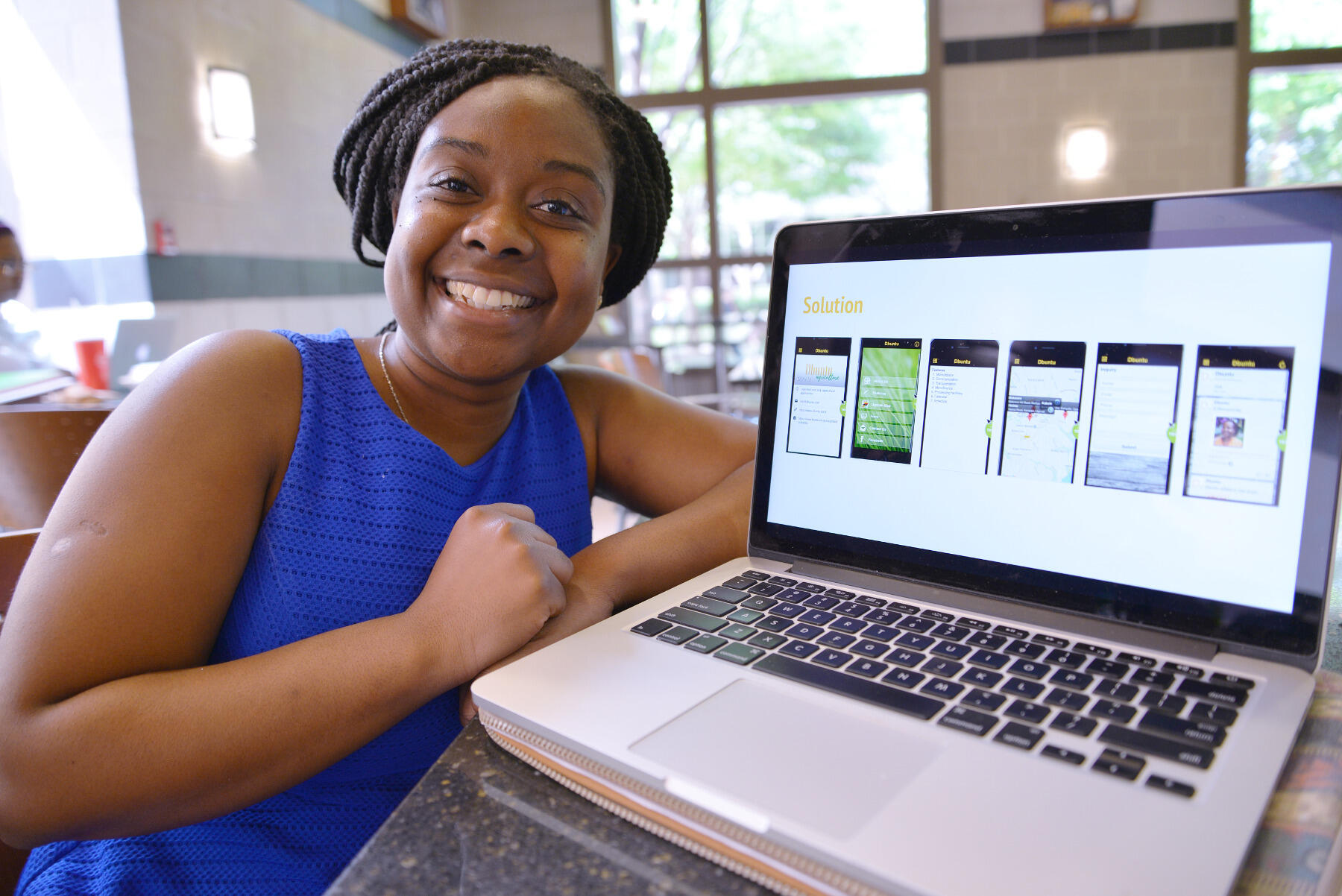
<br>Photos by Brian McNeill, University Public Affairs
June 27, 2017
VCU to send record-breaking contingent of students, alumni to Clinton Global Initiative University
Share this story
A record-breaking nine Virginia Commonwealth University students and alumni have been accepted to participate in this fall’s Clinton Global Initiative University, a prestigious event that brings together more than 1,100 innovative students from around the world who are committed to tackling some of the most pressing challenges in the areas of education, environment and climate change, peace and human rights, poverty alleviation and public health.
Among the students’ projects are an effort to eliminate synthetic trash in landfills via enzymes derived from fungi, a venture to develop a cutting-edge electronic health records system, a program that would deliver math and computer skills training in rural India, and the creation of an app that harnesses the power of big data to reduce the chances of food shortages in Africa. The contingent of nine students and alumni is the largest VCU has ever sent to the Clinton Global Initiative University.
|
Venture Creation University Venture Creation University is VCU's strategy for ensuring all students are exposed to innovation and entrepreneurship and have access to entrepreneurial pathways. To find out more about this effort, and to learn about innovation and entrepreneurial programs offered at VCU, visit entrepreneurship.vcu.edu. |
“It's a fantastic opportunity. We’re floored and humbled by the recognition,” said Michael Mahoney, a Master of Product Innovation student at VCU’s da Vinci Center for Innovation — a cross-disciplinary center focused on innovation and entrepreneurship — who is working on the project dealing with fungal enzymes that consume trash. “Being accepted into CGI U takes this idea off the whiteboard and into the world. At the same time, this is just a small step towards addressing a massive worldwide problem, and much still needs to be done about our consumption and throwaway attitudes.”
As part of the Clinton Global Initiative University, which is marking its 10th meeting and will be held Oct. 13–15 at Northeastern University in Boston, the participants will have opportunities to attend sessions and special events, network with peers, meet their assigned commitment mentors, build skills, identify potential partners, and possibly even obtain funding.
The VCU students are:
Michael Mahoney, a Master of Product Innovation student at the da Vinci Center, which is a collaboration of VCU’s Schools of the Arts, Business, Engineering and College of Humanities and Sciences.
Mahoney's venture, Mycelio LLC, in partnership with recent Brandcenter alumnus Rick Plautz, aims to launch a pilot program that will study the effectiveness of enzymes derived from fungi in breaking down polyurethane — one of the most diverse and ubiquitous synthetic materials on the planet. The idea is that the enzymes could prove to be a solution in eliminating the millions of tons of synthetic waste that continue to accumulate in landfills.
Valena Doe, a senior management major in the School of Business who is also studying for both a Venture Creation Certificate and an Innovation and Entrepreneurship Certificate in the da Vinci Center’s Innovate Living-Learning Program.
Doe, who is from Liberia, is seeking to address Liberia’s poor education system by providing STEM education to 120 boys and girls at a school in Paynesville, Liberia. As part of the project, Doe plans to work with her father’s construction company to remodel the school — which is run by her grandmother — and to recruit and train teachers who will provide new educational opportunities to the youth that that could lead to better lives for them and their families.
Mashaba Rashid, a junior biomedical engineering major in the School of Engineering.
Rashid’s Eco-Schools Leadership Initiative will bring VCU students to Richmond-area elementary schools to teach topics related to the environment, such as sustainable food, biodiversity, climate change, recycling and pollution. The goal is to create connections between college and elementary school students, and to raise awareness among children about environmental issues.
Sravya Dhavala, a sophomore chemical engineering major in the School of Engineering.
Dhavala’s project, Sabalikarana — the Kannada word for empowerment — seeks to empower middle-aged women in rural India by teaching them basic math and computer skills. The project will partner with local government schools to provide a safe space for the women to learn. Sabalikarana is targeting rural Indian women because many of them are small business owners who could benefit greatly from computer skills.

Tatenda Ndambakuwa, a senior in the Department of Mathematics and Applied Mathematics in the College of Humanities and Sciences.
Ndambakuwa, who grew up in Zimbabwe and vividly remembers the country’s food crisis in 2008, is co-founder of a startup, Dbuntu, that is developing a mobile app that will enable African farmers to upload data about their farm’s livestock and crop management, seed and feed access, milk production analysis, cattle pricing and other data points, thereby allowing real-time agriculture mapping and planning for all individual farms. The aggregated data will provide better visibility of Africa’s food production system and minimize the likelihood of food shortages and inefficiencies.
Dbuntu — a combination of “data” with the Nguni Bantu term meaning “humanity,” or “the belief in a universal bond of sharing that connects all humanity” — also has plans to develop future applications incorporating big data that will focus on reducing poverty, improving health care, and other topics.
Joel Zeballos, a Product Innovation Certificate student in the da Vinci Center and a senior marketing major in the School of Business, and Camille Brenke, a recent School of Nursing graduate.
Brenke and Zeballos, leaders of the social justice student organization Political Latinxs United for Movement and Action in Society at VCU, are planning to expand PLUMAS’ UndocuAlly trainings to greatly increase the number of VCU faculty and students and Richmond Public Schools teachers who are certified in being able to better support undocumented immigrant students populations.
R. Jerome Dixon, a Master of Decision Analytics student in the School of Business.
Dixon is developing a prototype electronic health system that can share data across multiple state agencies based on the architecture of the Virginia Longitudinal Data System, which comprises several component technologies that support secure, authorized research addressing today’s top policy and state program questions.
Garret Westlake, Ph.D., executive director of the da Vinci Center, said VCU is proud of the record number of VCU students that will be heading to the Clinton Global Initiative University.
“One of the most rewarding aspects of joining VCU as the executive director of the da Vinci Center has been connecting outstanding VCU students to national and international platforms,” Westlake said. “Having nine students and alumni accepted to CGI U is one example of the powerhouse that VCU is becoming through greater coordination of our university innovation and entrepreneurship efforts.”
VCU joined the Clinton Global Initiative University Network as a partner university in the spring. The new partnership demonstrates that VCU is rising as a leading university for innovation and entrepreneurship, Westlake said.
“Joining CGI U as a partner university is just one example of the da Vinci Center's commitment to real-world experiential education,” he said. “Through the process of working with faculty and students throughout the CGI U application process, as well as pre- and post-conference attendance, the da Vinci Center provides holistic support for student innovators in the form of coaching, funding and networking.
“VCU's commitment to student entrepreneurs and innovators is unique compared to peer institutions because the support transcends the traditional classroom and engagement platforms and represents a true innovation ecosystem,” he added.
Somiah Lattimore, director of experiential education for the da Vinci Center, said it is notable that the VCU students attending the Clinton Global Initiative University come from across VCU.
“This shows that VCU is really being positioned as an institution that takes innovation and entrepreneurship seriously,” she said. “VCU as a university is committed to innovation and entrepreneurship — and not just a single center or a school or a college.”
For the students, attending the Clinton Global Initiative University represents a chance to get their projects off the ground and make the world a better place.
“I was so excited that I [will have] the opportunity to talk to people about my goals and plans for Sabalikarna as well as meet other people with a goal to bring about change in the world. I absolutely can’t wait for the day I actually get to do it,” Dhavala said. “Through Sabalikarna, I really want to help women in rural areas to stand on their own feet and open up small businesses and also help those expand their already existing businesses through this move. I want to be able to contribute to change in the society that I spent part of life growing up in.”
Subscribe to VCU News
Subscribe to VCU News at newsletter.vcu.edu and receive a selection of stories, videos, photos, news clips and event listings in your inbox.










